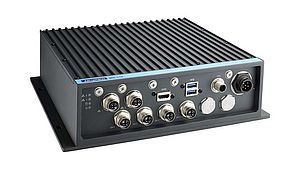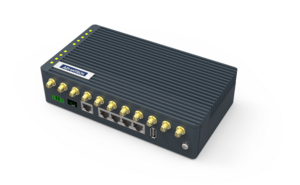IEN Europe: What major trends do you foresee emerging in the industrial equipment manufacturing sector over the next 5-10 years? How do you anticipate these trends will shape your company’s strategy?
Rick de Vries: There are some major trends we can see. Typically, standard trends in machine building are flexibility, reliability, product speed and connectivity. Machine builders always investigate these areas. We have also noticed a focus on the necessity to develop the processes of circular economy industries.
But the big trend truly is virtualisation. We’re often asked, “How can I change my automation processes and integrate virtual platforms?” or “What benefit does a digital twin bring to a local machine; and how do I obtain a comprehensive digital twin in the first place?” Those are important questions for manufacturers, because PC-based controls are increasingly replacing classical PLC controlled processes.
However, what also needs to be considered is something that’s been overlooked by current trends: the Cyber Resilience Act (CRA), which is coming up in 2027. A lot of machine builders do not recognise the necessity and the challenges it may give them regarding their machines. In response to this, Advantech is expanding its partner ecosystem. On top of our existing ecosystem, which is already extensive, we are building an ecosystem for brownfield customers. We have developed a complete solution with two major technology players in the security area, so customers can easily plug in and secure their machines to fulfil the requirements of the CRA. We are also adding technologies to our hardware designs and customer designs that will help fulfil the requirements, as well as prove this is being done.
This is a big challenge. But Advantech is pushing forward because we put a lot of energy into platform solutions. Our partnerships are a great example, like the one we have with VMware. They’re a part of the journey to help customers reduce cost, raise efficiency, and deploy services, because you need a network of different experts in today’s market. These are the key trends we’re putting a lot of effort into.
IEN Europe: Next up is a question regarding security. Over the past few months, we have seen that a lot of German companies are neither familiar with the NIS2 requirements, nor what they have to do about them. How do you see the situation, and can you help your customers?
Rick de Vries: This is also something we’ve noticed. Companies don’t readily see how they are affected. It is a big process, and we’re acting on it. One side of the story is how we handle our internal cybersecurity resilience processes. The other is the development of our hardware, and the firmware we have in our systems today. It’s also important to avoid any vulnerabilities, and this is the same with components we buy that have firmware inside. We always must ask ourselves where the vulnerabilities are.
We are building a system within Advantech so that we can easily report data to our customers and partners. Making the software we develop cyber resilient is part of this process, as well as that of our eco-partners. There is also a new law currently being processed relating to the use of AI, so we’re looking into the legality of that as well. There are always two stories. One is how we’d apply the use of AI, but we also must ask ourselves about AI too. We ask questions like; “What are the effects?” and “What do we need to do to make sure that we harden the hardware and firmware that uses AI?”
We do a lot to make ourselves ready for the market. But we also advise, and we have partners who really can go deep into the processes we’ve already spoken about. For example, we're working very closely with Securitas for the Cyber Resilience Act. We will also present this topic at the SPS show in Nuremberg alongside a partner. We’re ready for the discussion to take place; we’re there for our customers, and we’re ready to consult them on how to make machines resultant.
IEN Europe: Another big trend that you haven't mentioned so far, which is very important, is how to make manufacturing sustainable. How is your vision influenced by regulations such as the EU Green Deal, and how do your customers benefit from your efforts?
Rick de Vries: As we are not building whole machines, we are always aware that we’re just one part of the puzzle. Sustainability, carbon footprints and the whole ESG journey involve various processes for all companies, including ours. We have established a comprehensive emissions process and integrated carbon initiatives into our designs. At SPS, we will demonstrate a 45% reduction in our carbon footprint, reflecting our commitment to minimising carbon impacts in both our components and processes. But that also must fit into the journey of our customers. Lifecycle management, for example, is an important part of sustainability. The longer you can use your product efficiently and safely, the better it is, but you also need partners that can work on refurbishments or upgrades. And that is an advantage in philosophy we have already had for many years with our modular concept.
What does that mean for our customers? Well, say that I have a CPU, but I want to have a bigger one. We could certainly upgrade it. But if I wanted more memory, or another drive, I’d need to change my WiFi 3 to WiFi 6. However, instead of having to replace everything with a new product, we could instead plug in a new board set. This is the kind of extended functionality we are aiming for, and many customers want that on their machines.
So, how can we help them embrace virtualisation and add computing power to offload processes, without taking everything out of their machine and replacing entire systems? An important part of it all is that Advantech designs everything using standards. An example is IPCs – we use IEEE standards. We’ve demonstrated that well in the semiconductors industry, for example.
But what does that design concept mean for the customer, you might ask? Well, a hypothetical customer could buy a chassis and add it to his machine. There may be an old-fashioned motherboard inside, but they could just take it out and replace it with a new motherboard. They wouldn’t have to renew the chassis, and everything else would still fit. The only part our customer would have to change would be the motherboard, avoiding waste while still being able to renew their CPU. This hypothetical scenario is what our philosophy is all about when it comes to circular industry and sustainability.
IEN Europe: But if the products live longer, doesn’t that also mean the software has to be kept up to date for longer as well?
Rick de Vries: Yes, it does. The software, the OS, the firmware, but not only these. We select partners for components, such as CPUs and GPUs, with that in mind, so that we can choose the right components with the support for sustainability. But there are constantly new topics coming up, and you have to ask; “How do I harden my old hardware for that?” Our partners would tell us something like; “You can’t harden the old hardware anymore. And you can’t go into the hardware to make changes.” But what we can do is create a plugin so that part of the hardware is hardened again and is now controlled by a plugin solution. And it works!
IEN Europe: What role does digital transformation and Industry 4.0 play in the industrial equipment manufacturing industry? How is Advantech adapting to this transformation?
Rick de Vries: That’s also one of the biggest challenges we see in our customer base. There’s a lot of knowledge disappearing, as well as increasing labour challenges. We’re finding ourselves becoming consultants more often, instead of being asked to simply make and deliver products. But we can’t do that alone. We have seen in the past that there are so many sub-elements in a process, just like what you said with Artificial Intelligence. We need the ecosystem I mentioned earlier, and we’re building one to get all the necessary support, processes, and knowledge together to support our machine builders in their journey, because they’ve also realised, they just can’t do it themselves.
Advantech takes the lead by establishing a partnership programme, it helps our customers understand that we are a supplier, and our partners help us find solutions. We create, in this sense, competency. We train our customers to know how to use this kind of technology.
Of course, we have a strong partnership with innovation partners in the chipset technology world. They also bring a lot of knowledge into our company to help train us. It helps us understand what we can do with technology, and how we can optimise processes and make new innovations and solutions on the platform that customers are looking for. We do find ourselves being asked to organise workshops for our customers, especially for machine builders, regarding hardware philosophy. They want to understand the ESG journey and come up with ideas to cut costs and create new machine topologies. As you can see, even though we used to just be a hardware seller, we are slowly finding ourselves in an advisory position for the whole process.
That means we’re in a period of transition, and we need to be able to provide our customers with the right knowledge that applies to their specific situation, challenge sand issues. We’ve also noticed that consultative selling changes relationships. Instead of just having the typical supplier-customer relationship, we’re finding ourselves with much more trusting partnerships.
IEN Europe: So, after creating this network, how many partners do you currently have for tackling these different problems?
Rick de Vries: We already have more than 250 partnerships, and I’m only talking about our European ecosystem of the Industrial IoT division group – not the wider Advantech Europe group! We can split the ecosystem into key partnerships, like Intel, Microsoft, CODESYS, and other software and hardware-related technology partners for our biggest endeavours. But we also have the ISVs (independent software vendors) as well as the system integrators. We need these partners because we train together, which in turn gets the product to better fit the market. They help us identify current challenges in the market, and push us to find the relevant solution. And that’s really starting to work well.
That’s also the flip side of the story. Instead of relying solely on our own sales organisation, we have a network of ecosystem partners who act as our ambassadors and drive sales as well. Of course, we still have the traditional distribution channel, but we're working more and more with the ecosystem partners, the system integrator partners and the consultancy partners, like OBS Orange Business Services for example. Advantech is heading in that direction when, previously, only big players like Siemens were.
As a business, we’re growing in entirely new ways. This is because we now have the right partners to step into the world with us, a world that they know; we have the technology, but they have the knowledge to pitch it in the right way. That's the journey we are in. By focusing both on our verticals and our sector, you learn better, and with an ecosystem, you can obtain a much better approach for both sales and solutions.
It's a slow trend change. But you also see that partners, customers, and machine builders are moving in that direction. It can be difficult for them, because in the past, they did everything themselves, and now they must relinquish control and learn how to trust the supplier and hardware manufacturer to provide an IoT solution that will bring them to the next level of innovation for their machines. It's a learning curve for all parties involved.
IEN Europe: Thank you for your insights!
sps 2024 exhibitor: Hall 7/370























